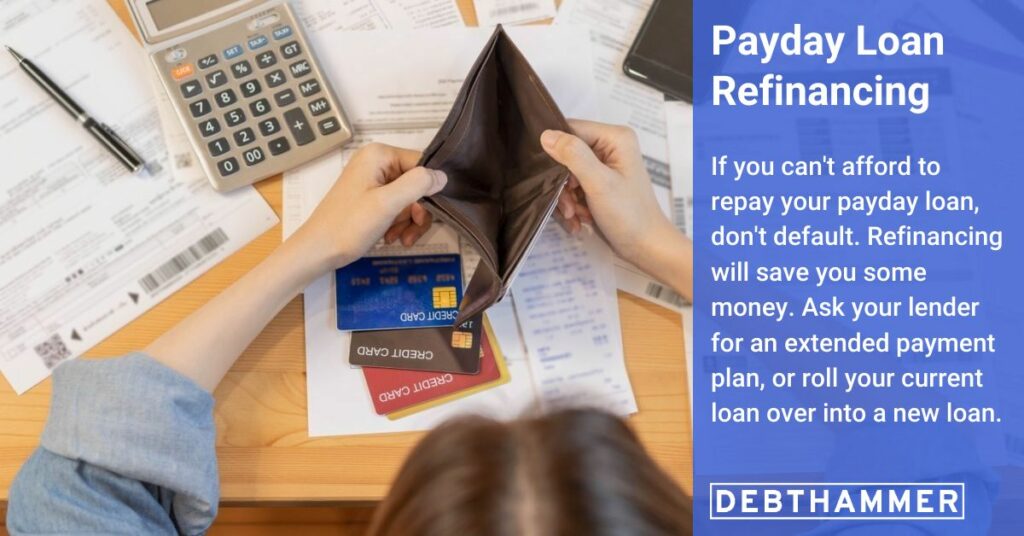Refinancing your payday loan means revising or replacing your existing loan contract. This can mean extending your loan term, setting up a payment plan or getting a completely new loan (usually from the same lender, with one key exception.)
Almost 80% of payday loan borrowers can’t afford to repay their loans on time. If this sounds familiar, you may need to consider refinancing.
READ MORE: How to get out of payday loan debt in 8 steps
Need a lower payment?
DebtHammer may be able to help.
Table of Contents
How to refinance a payday loan
All of these options are relatively simple and there are no complicated credit score requirements.
1. Roll it over into a new loan
This is the most common solution and also the least recommended. Every time you roll your current loan into a new payday loan, you’ll pay a new set of fees and the loan balance will continue to increase. Consider this: If you’re struggling to repay the loan now, will you be in a position to pay even more in two weeks? Unless you’re trying to buy time while waiting for an income tax refund or a child support payment, rollovers are usually expensive and there are better options to try first.
2. Ask your payday lender about an extended payment plan
Some payday loan lenders are required to offer repayment plans that allow you to pay your loan off in fixed installments over a longer repayment period instead of paying off the entire loan in a single lump sum. However, there are several caveats:
- These are only available BEFORE your loan’s originally scheduled due date, so if you think you’ll need an extension, ask your lender about this at least two days before your payment is due.
- Payday lenders who are members of the Community Financial Services Association of America (a trade association also known as CFSAA) are required to offer EPPs to all borrowers.
- Only 16 states require payday lenders to offer EPP loans. They are Alabama, Alaska, California, Delaware, Florida, Idaho, Indiana, Louisiana, Michigan, Nevada, South Carolina, Utah, Washington, Wisconsin, and Wyoming.
- Your lender isn’t required to offer information about EPP loan offers before you sign a loan contract unless you live in the following states: Florida, Idaho, Louisiana, Michigan, South Carolina, Utah, and Wisconsin. If you live elsewhere, it’s up to you to ask about them.
READ MORE: Payday loan EPPs
3. Ask your payday lender about other options
They may be willing to negotiate lower fees or extend your current loan term instead of forcing you to roll it over into a new loan. Some lenders offer hardship programs, and some are even willing to refinance their own loans. If it’s an online lender, contact them by phone rather than email.
Before you initiate contact, figure out whether you have a traditional payday loan (repaid in one lump sum on your next payday) or an installment payday loan (repaid over a few months in a series of fixed payments.) Many lenders are more willing to refinance installment loans, and they may have options to convert a traditional payday loan into an installment loan.
Be honest with your lender about your financial situation, and ask them if they have any hardship programs, options for extended payments or would be willing to lower the annual percentage rate you’re being charged. Some may even be willing to accept a lower payment amount and consider your loan repaid in full.
Pro tip: The most important outcome from these negotiations is to prevent your payday lender from sending your delinquent debt to a debt collector. At that point, it will end up on your credit report and hurt your credit score.
Before you contact your lender, rescind access to your bank account
Payday lenders require access to your bank account or a postdated check before your original loan is approved. If the money to repay the loan is not in your account, you must rescind this access in writing with both the lender and your bank before overdraft fees start to mount.
Pro tip: Once your lender loses access to your bank account, you’ll have a bit more flexibility to negotiate. Lenders don’t have much incentive if they know they can simply keep trying to withdraw the money from your bank account.
READ MORE: What happens if you close a bank account and default on a payday loan?
4. Apply for a Payday Alternative Loan
Credit unions offer a product called Payday Alternative Loans. These are similar to payday loans in that they are short-term loans with no credit check, but have lower interest rates. PALs are installment loans that max out at $2,000 and are repaid in fixed loan payments with a repayment term of up to two years. The interest rate is capped at 26%.
Pro tip: Basically, what you do is take out a small personal loan (the PAL) and use it as a debt consolidation loan: The PAL money pays off your payday loan and any other higher-interest debts you might have. After that, you can pay off the PAL in fixed installments.
Even though you’ll be paying off the PAL for a longer period of time, the lower rate can save you quite a bit of money, particularly if you’re regularly rolling over payday loans into new loans.
While many credit unions have specific membership criteria, a few are open to everyone. You will have to open an account, but many allow you to do this with as little as $10. Here are some of the best options.
There are plenty of federal credit unions across the U.S. Not all offer PALs, but locating one that does is not too difficult. This locator will help you find one.
5. Use a credit card cash advance
If you already have a credit card (and it isn’t maxed out with credit card debt), you can usually get a cash advance at any ATM. Interest starts accruing on these immediately, but credit card interest rates are significantly lower than payday loan interest rates.
Pros and cons of refinancing payday loans
| Pros | Cons |
| Could extend your repayment term, giving you more time to repay the loan | The fees, whether for a rollover or refinance, will add up |
| Keeping it out of collections or converting it to a traditional installment loan could prevent credit score damage | It won’t solve your underlying spending issues |
| You may pay lower interest rates and fees | You might have to go through the hassle of applying for a new loan |
| Your payday lender may already offer refinancing options you don’t know about | Most payday lenders will steer you toward rollovers, so you may have to push for other options. |
Read your loan agreement carefully
Ensure you know the additional fees that come with changing your loan contract. Those are usually rolled into your new loan amount if you can’t repay the loan in full from your next paycheck, and it could make your loan even more difficult to repay. Are there penalties if you pay your loan off early? Make sure your lender is properly licensed to issue loans in your state. If your loan is illegal, you may not be legally obligated to repay it.
If you’re uncertain about the legal status of your loan, contact a lawyer or the Consumer Financial Protection Bureau for advice.
Avoid more high-interest loans
Whatever you do, the worst thing you can do is go to another payday loan lender to apply for a completely new payday loan and then use that money to pay your other payday loan. The fees add up, and every time your next payday rolls around, your money will need to go toward repaying payday loans. These types of loans are designed to be difficult to repay, and leave you trapped in a cycle of debt.
The average payday loan has about $520 in fees for the initial loan of $375, and more than 80% of payday loans are rolled over. These rollovers reset the clock with a new set of fees and interest.
More debt relief options
- Payday loan consolidation
- Debt Management Plan
READ MORE: How does nonprofit credit counseling work?
DebtHammer: Legitimate payday loan relief that works
Getting out of debt isn’t easy, but with the help of an expert, DebtHammer, it can be painless. We create an easy-to-understand plan with no hidden fees and offer a manageable monthly payment plan. Click here to start your free consultation.
The bottom line
Payday loans are designed to target Americans with bad credit. The high interest rates and quick repayment terms make them very difficult to repay.
But if you’re in a bind, there are ways to refinance your loan so that you don’t have to hand over your entire paycheck to the payday lender, leaving you with nothing to live on until your next paycheck rolls around.


